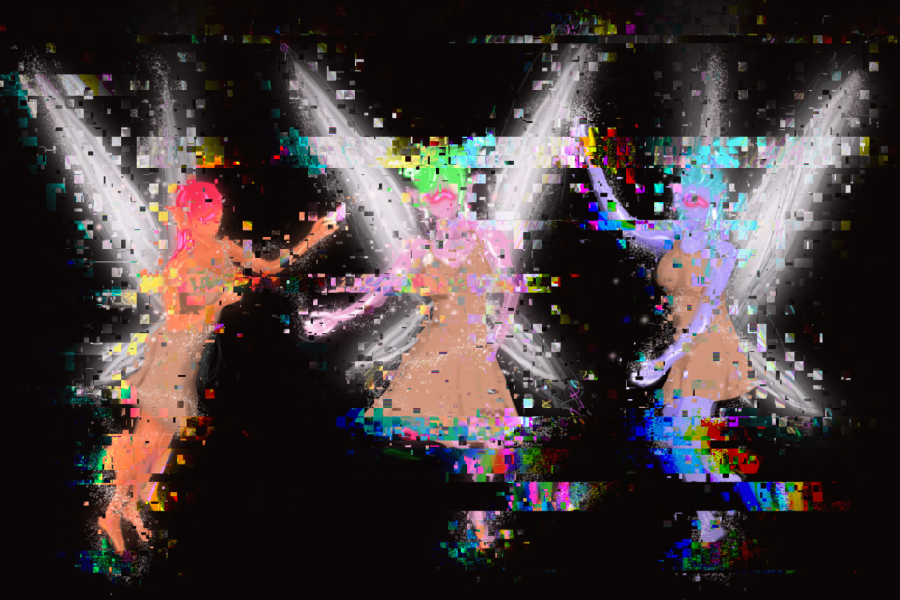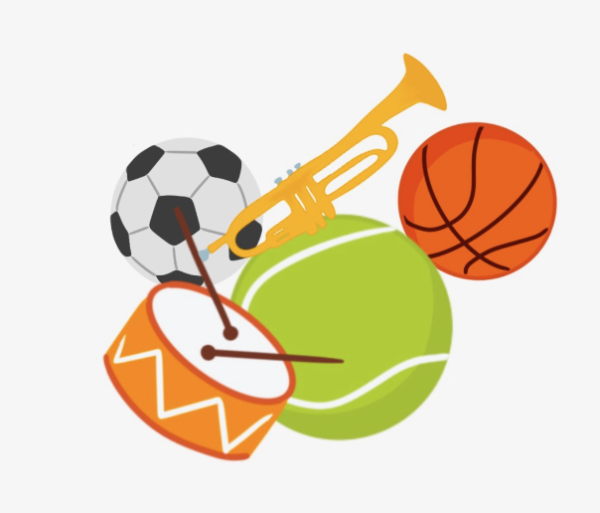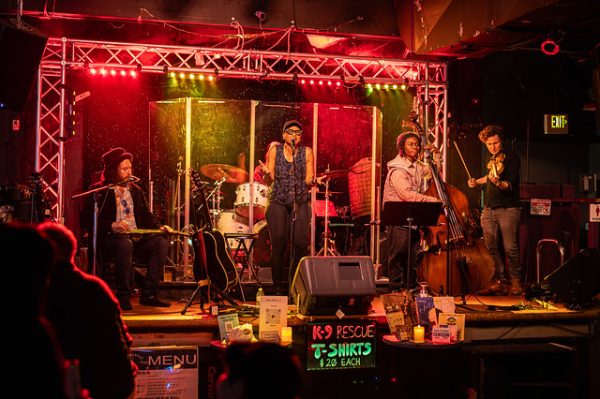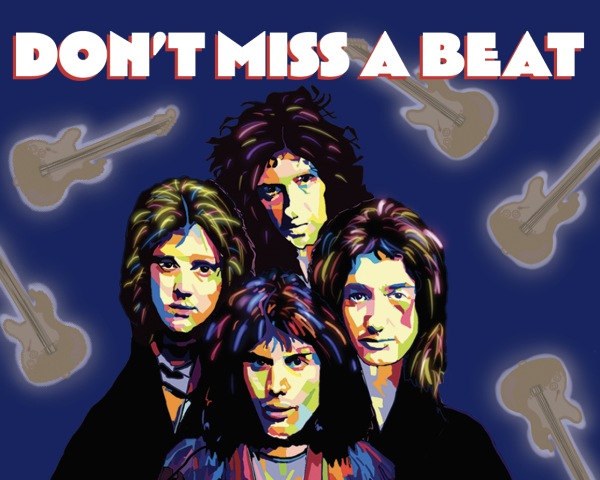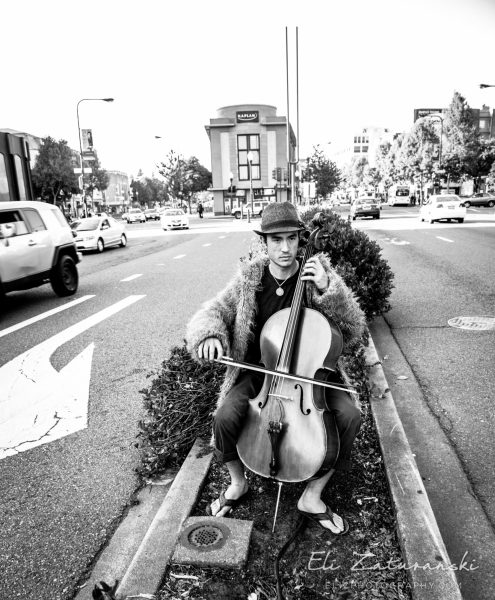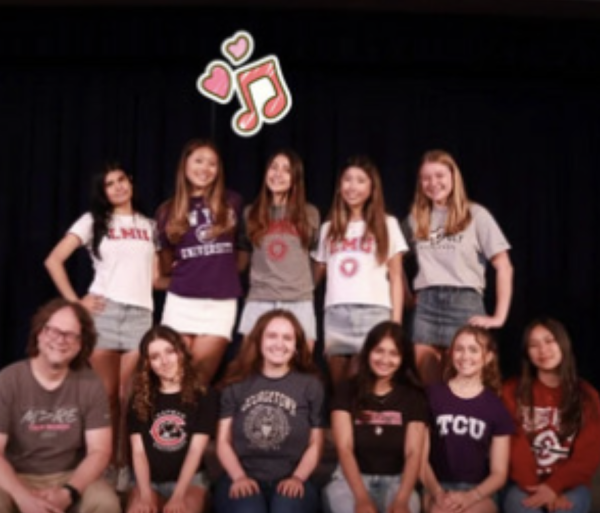Hyper Popular
Exploring the rise of hyperpop music and the unique community behind it
Flashy and unapologetically in-your-face, the noise of the opening band emanates from the twisty hallway leading into San Francisco’s August Hall. The main act Dorian Electra comes out on stage with an outfit, attitude and ensemble proving they are even more flamboyant than the opener, to the delight of the audience waiting below. The electric atmosphere of Dorian Electra’s concert is a hallmark of music from the ‘hyperpop’ genre.
Hyperpop is a term used to describe a rapidly growing fringe genre of pop, encompassing unique, eclectic, experimental music that is difficult to fit into one category. Although there is much variety in what is considered hyperpop, the term generally refers to music with exaggerated features of pop, R&B and rap such as extreme levels of autotune, rhyming or bass.
Digital technology has enabled artists to enlist techniques in the creation of their songs that produce a remarkably different sound than those made using traditional instruments such as guitar, piano or even synth.
As a hyperpop fan, senior James Thomas has witnessed how hyperpop expanded musical boundaries. “Without the internet, we wouldn’t be hearing [this kind of sound],” Thomas said. “We would still be [using] traditional instruments, but the internet has changed what is possible and what is considered music.”
Hyperpop’s rise is only possible due to the advent of the information age. “The combination of sampling [a] very popular song and blown out bass and distorted vocals and raised pitches, it creates this really unique sound which feels like a parody of what is popular in modern pop and popular music,” Thomas said.
‘Hyperpop’ is generally a convenient label given to artists and songs by streaming services and consumers, not chosen by the artists themselves. For artist SEBii, whose music is featured on Spotify’s ‘hyperpop’ playlist, this is certainly the case.
“Everybody has their own definition of hyperpop,” SEBii said. “[Hyperpop] is really just a word that labels a group of artists who happened to come up at the same time. So [people] are just like, ‘Oh, it’s something new, let’s call it hyperpop.’”
SEBii is not concerned with the specific labels his songs are given; instead, he focuses on the joy that making music brings him.
“Some people call [the music I make] hyperpop,” SEBii said. “I like to think of my music as just super fun.”
Music that otherwise might not have much in common is placed under a single umbrella for ease of access by consumers. “The stuff I made, it’s called hyperpop, but then Charli XCX is called hyperpop and then Bladee [fans] consider Bladee hyperpop,” SEbii said. “All three of those things are extremely different, sonically and stylistically.”
However, songs deemed ‘hyperpop’ often share common roots that can be traced between different artists. “[Hyperpop artists] play a lot of 2000s pop tropes but they take those cliches to the max,” SEBii said. “It’s like, let’s make super cheesy music, but it’s on purpose, it’s ironic, it’s really self aware.”
One of hyperpop’s newer artists who has already cemented themselves as integral to the hyperpop community is Dorian Electra. Having predominantly queer themes in both albums they have released, the larger queer community have embraced the resonant lyrics and bombastic nature of their songs as something to take pride in.
The brash and unique nature of the music provides a liberating effect and creates an incredibly accepting community and environment for many queer fans.
“[The reason] why people connect and resonate with the music is because a lot of people can relate to a lot of the music,” SEBii said. “Someone like Dorian, they make music that is really important for the queer community.”
Part of the reason the community is so drawn to hyperpop is an overblown style that holds an appeal for some. “It creates this gross exaggeration of all the current trends and cliches in pop music and in terms of production, like ‘Oh, people like bass in songs. So let’s blow out all the bass’ [and] ‘Oh, people like auto-tune vocals, so let’s turn that up,’” Thomas said.
The irreverent, self-aware quality that hyperpop possesses translates to a fun sound that engages listeners’ emotions. “It’s really vibrant and it makes me feel so happy every time I listen to it,” junior Max Schrage said.
Hyperpop’s extreme, maximalist nature amplifies positive feelings but also increases any potential negative biases and feelings in the listener. “It’s very much in your face and unapologetic and that makes a sound that’s not for everybody,” Thomas said. “Those of us that do resonate with it, it resonates a lot since it’s very intense.”
This creates a barrier that prevents some people from becoming hyperpop fans. “On first listen it will be very abrasive and a lot of people just can’t [get] past that,” Thomas said.
Still, those who do seek out hyperpop are exposed to sounds with charm rarely found elsewhere in music. “I play the drums and there’s really interesting drum patterns in the background of hyperpop songs compared to other genres of music,” Schrage said.
Hyperpop’s popularity has skyrocketed during the pandemic, largely due to popular audios on TikTok, such as those by duo ‘100 gecs.’
“TikTok and other social media [platforms] have a great influence on [hyperpop] because they’re obviously really large pop-culture venues right now and so when you see that music and you listen to just an exciting snippet of it you might want to discover more,” Schrage said.
As social media helped grow hyperpop’s popularity, a genuine and collaborative community has formed around the genre. “It’s definitely a community that is ‘anything goes,’” Thomas said.
Hyperpop’s sound has been shaped by the unrestrained and unapologetic experimentation of the fans and creators alike.
“It’s different [from other communities in that] everybody is just super, super collaborative. Everyone knows each other and a lot of people are friends with each other,” SEBii said. “[In a] lot of other communities, people might not be as open to collaborate and work with other people, especially if they don’t make music similar to them.”
Due to the genre’s rise during the pandemic, the community is largely online, utilizing platforms such as Soundcloud, Twitch and Discord to make music and communicate. For SEBii, the online community provides opportunities for collaboration, such as when he streams on Twitch and allows fans to send in beats which he reviews and records to.
“I think they [SEBii’s Twitch community] are some of the most talented producers but they’re just pretty unknown,” SEBii said. “So, working with people in my Twitch community is also really fun.” This just-for-fun online collaboration has led to more formal projects such as the song ‘DONOrr’ which was originally created with his fans on Twitch.
At the end of the day, hyperpop is all about exploring new things for the sake of enjoyment and community. “It’s just different,” Thomas said. “It’s very abstract but there’s something different about this group of people.”
Featured Image by Kellyn Scheel
Print Issue
Please click on the three vertical dots on the top right-hand corner, then select “Two page view.”
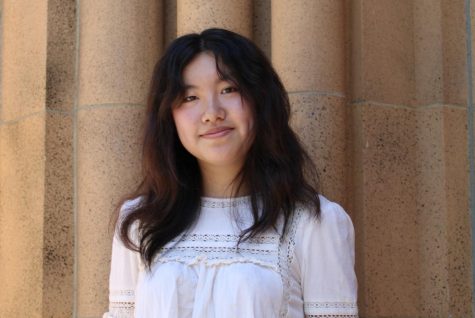
2021-2022 - Staff Writer
2022-2023 - Managing Editor
I joined C Mag because I love that journalism helps shine a light on issues that need addressing...
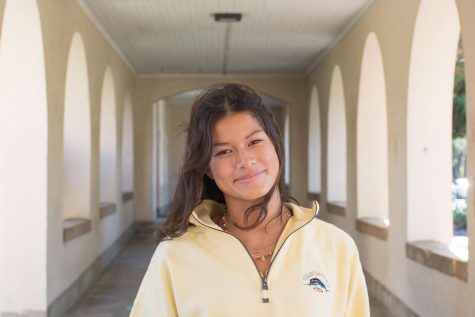
2020-2021 - Staff Writer
2021-2022 - Managing Editor
I joined C magazine because I love the creativity and culture, plus we get to write...
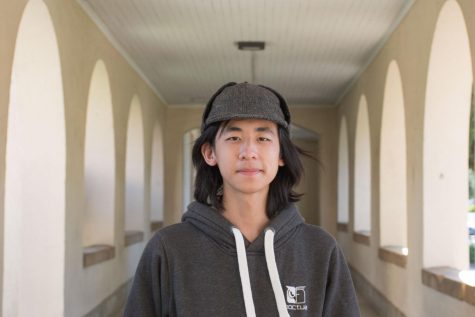
2021 - 2022 - Staff Writer
I joined C Mag because I wanted to experience the with something new and explore something that is not around my primary...


